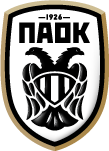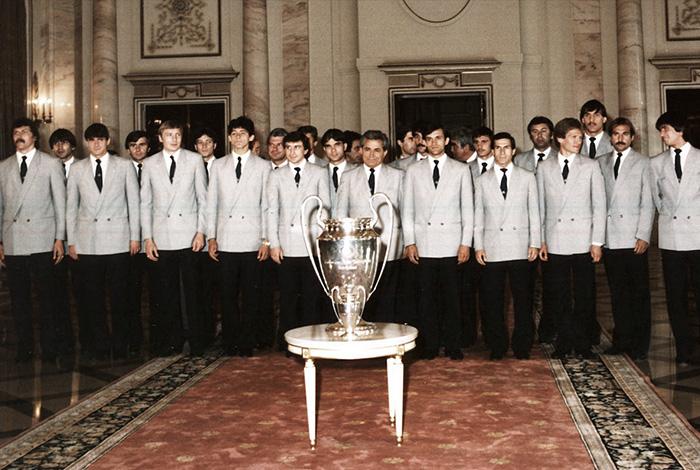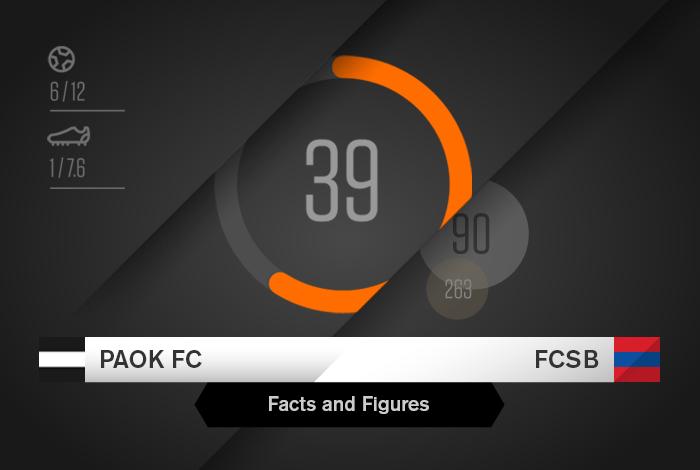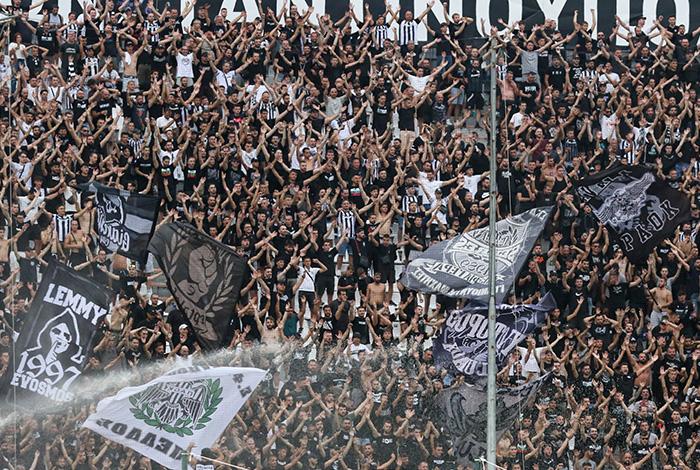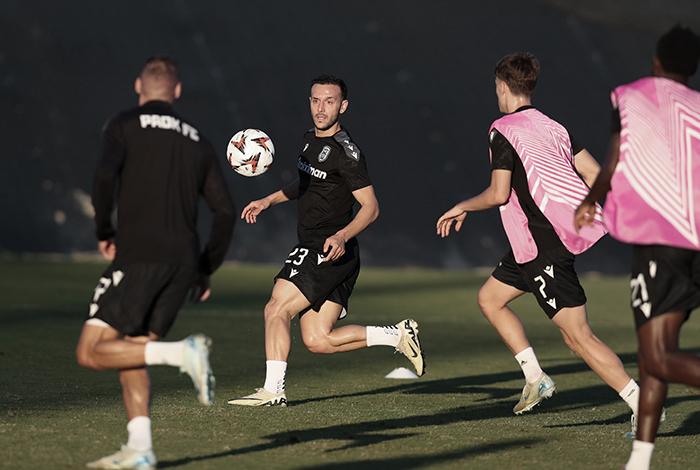A former European champion comes to the Toumba
Their impressive trophy cabinet contains a Champions Cup and a European Super Cup, stadning proudly next to the 27 league championship trophies and so many other titles, honours and records that make FC FCSB – Steaua Bucharest – the most successful and popular team in Romania.
The second match for PAOK in the League Phase of the Europa League and the first at the Toumba Stadium is against the team coached by an old acquaintance of ours, the Cypriot Ilias Charalambous (he played at PAOK from 2005 to 2007), who took over the reins of the team in March 2023.
- Last season Steaua won the league with 49 points, just three points behind the second-placed Cluj, while in the Romanian Cup they were eliminated early in the group stage. As for Europe, they got through the second qualifying round of the Champions League with two wins against CSKA Sofia 1948, but were knocked out in the third round by FC Midtjyland.
- Steaua reached the League Phase of the Europa League starting from the first qualifying round of the champions’ road to the Champions League. They got past Virtus San Marino with 11 goals in total and then Maccabi Tel Aviv afterwards, despite a 1-1 draw in Romania, they won with a goal in the later stages in the second leg in Budapest.
- Along with the titles before 2003, which were called into question due to ownership changes, Steaua has 27 championships, 24 Romanian Cups, seven Romanian Super Cups. As well as a valuable European Champions Cup, a European Super Cup, another Champions Cup final, an Intercontinental Cup final, two European Cup Winners’ Cup quarter-finals and an appearance in the UEFA Cup semi-finals! At the same time, they are the only Romanian club that from 2002 to 2018 managed to qualify for the group stages of a European competition. They have spent their entire history in the top division of the Romanian football league.
- The club was founded in 1947 and belonged to the Ministry of National Defense, through the CSA Steaua Bucureşti sports club of the same name. In 1998 the football department and its facilities were separated and taken over by a group of shareholders in a privatization program that «ran» after Ceausescu. However, CSA Steaua Bucureşti has been in conflict with the football club since 2011, claiming it was a new and separate entity. This resulted in several court cases and the forced name change from FC Steaua București to FC FCSB in early 2017.
- Under the leadership of coaches Emmerich Yenei and Angel Iordanescu, Steaua had an impressive run in the league in the 1984–85 season, winning it after a six-year drought. And an amazing run in the European Champions Cup followed, which brought them to the final on 7 May 1986 against Barcelona at the Sánchez Pitjuán. The match went to penalties (0-0 at regular time), with the legendary Helmut Dukandam saving all four Spanish penalties he faced. Dukandam became the first Romanian to enter the Guinness Book of Records and Steaua the first Eastern European team to win the supreme European collective trophy.
- Steaua recorded one more Champions Cup semi-final against Benfica (1987–88) and another final in 1989, in which they were beaten 4–0 by Marco van Basten, Ruud Gullit, and Frank Rijkaard’s Milan.
- Gheorghe Hadji, the greatest Romanian footballer of all time, joined the club a few months later, scoring the only goal in the match against Dynamo Kyiv that brought Steaua the European Super Cup on 24 February 1987 in Monaco. Just two months after losing the Intercontinental Cup (1–0) to River Plate.
- From June 1986 to September 1989, Steaua went on an unbeaten run of 104 matches in the league, setting a world record for that era and a European record that still stands.
- From 1990 onwards, the Romanian revolution led the country to the free market, so many Steaua players left for other clubs in Europe and beyond. The team did however manage to reach the group stage of the Champions League three seasons in a row (1994 to 1997), reaching the quarter-finals of the Cup Winners’ Cup in 1993.
- In 2003, Gigi Becali managed to gain control of the club, transforming it from a non-profit to a public joint-stock company.
- They are the most popular club in Romania. According to a 2007 survey, the club represents approximately 42% of all Romanian football fans.
- The club’s all-time top scorer in the league is Angel Iordanescu with 146 goals, as well as the longest-serving manager in the club’s history (1986–1990 and 1992–1996).
- The club’s most successful manager who also won the Champions Cup in 1986 is Emmerich Genney, who started as assistant in 1972, became head coach in 1974, was sacked in 1978, returned in 1983, left again at the end of the season and a few months after his dismissal he returned to make history. After winning the Champions Cup, Yenei took charge of the Romanian national team, leaving behind his 36-year-old assistant Angel Iordanescu, who won the European Super Cup in 1988, reached the semi-finals of the Champions Cup in the 1987-88 season, and also the final the following year, against that unbeaten Milan of Arrigo Sacchi. As for Yenei, he reached the last 16 of the 1990 World Cup with the Romanian national team.
- The record for appearances with the team (370) belongs to Tudorel Stoika.
- In January 2021, Denis Mann signed for Parma for €13,000,000, a record transfer fee for a Romanian club. The previous similar record belonged to Giorgi Hadji, when in 1990 Real Madrid paid 4,300,000 dollars to make him theirs.
- FCSB’s Arena Nationala is the largest stadium in Romania. His record is 50,016 tickets in a Europa League quarter-final against Chelsea in the 2012–13 season. Its capacity is 55,635 spectators and beyond Steaua, used by Dinamo Bucharest and the Romanian national team. It opened its gates in 2011 and its construction cost 235 million euros.
- The club has a long-standing rivalry with neighbors Dinamo Bucharest, with matches between the two commonly referred to as the «eternal derby» or «Romanian derby». Their have been more than 150 such derbies so far. With a combined 44 titles (Steaua 26 and Dinamo 18), the two teams have won 36 more than Liga I’s third most successful club, Vinus Bucharest.
- The Ministry of National Defense sued Steaua in 2011, claiming, among other things, that the Romanian military was the rightful owner of the Steaua logo. The Supreme Court ruled in favor of the military and on 3 December 2014 removed the football club’s badge. Steaua were forced to play their next home match against CSM Studențesc Iași without it. The new badge was unveiled in January 2015 and is an eight-pointed star containing the letters ‘FCSB’, which eventually became the club’s official name in 2017.
